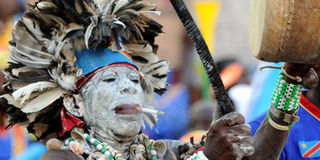Realising they are firing blanks, players resort to witchcraft

PHOTO | STEPHANE DE SAKUTIN | SANGOMA OR MEDICINE MAN? This Democratic Republic of Congo fan, clearly, has a unique style of cheering during their Africa Cup of Nations clash with Ghana at the Nelson Mandela Bay Stadium in Port Elizabeth on January 20, 2013. They drew 2-2.
What you need to know:
- Top South African clubs and officials have been linked with visits to witchdoctors to secure match victory
JOHANNESBURG
South Africa’s sangomas (witchdoctors) are in for roaring business after the goalless opening day of the 2013 Africa Cup of Nations.
Bafana Bafana fired blanks in their goalless draw against Cape Verde in their opening Johannesburg fixture, lending credence to calls here from fans for coach Gordon Ingesund and his technical team to “summon the spirits.”
Most or some of South African football games are not just won or lost on the pitch, there is often a dark force involved in some cases - a sangoma.
Top club in South Africa’s Premier Soccer League, Orlando Pirates, Kaizer Chiefs and Jomo Cosmos are said to be the most notorious in the use of magic in the South African football league, a practice that is now becoming a cause for concern.
Santos goalkeeper Tshepo Motsoeneng has also been shown on television footage pouring some substance between the posts before a game. And South Africa’s national team, Bafana Bafana (the boys), his not without blemish either, thanks to the involvement of the country’s football federation.
Last June, the South African Football Association (Safa) paid a sangoma R90,000 (approximately Sh900,000), setting stage for a huge debate on the use of black magic in the country’s football.
Common practice
While many South Africans continue to shy away from the debate on whether or not people in the football industry employ the services of sangomas, it has emerged it remains a common practice in the country’s football. Players and club officials often visit them secretly.
A sangoma, who gave his name as Makaba Nkomeni, says that apart from ordinary people with personal problems in life, sportsmen, too, are common visitors to sangomas.
“Some of the footballers (who seek the services) want to get into big clubs and get better deals while officials want good results. We deal with them on a weekly basis,” Nkomeni, who did not want to disclose his clients, said.
The now famous Bafana Bafana sangoma S’bonelo Madela said he provided “magic” for the Bafana Bafana to beat France in the third group match at the 2010 World Cup held in the country.
Real threat
Safa had paid him only R10,000 (Sh100,000) of the agreed-upon R100,000 (Sh1 million). But when Safa reneged on the deal, Madela sensationally declared that the South African national football team would not win any game until the money had been paid.
He said he had locked up all the goals in a bottle of muti.
He claims that the failure by South Africa to qualify to the 2012 Africa Cup of Nations tournament was as a result of Safa’s failure to pay him. “If the national football team wants to start winning, then Safa bosses must settle their debt to me first,” he was widely quoted as saying in South African media.
Safa vice president, Mwelo Nonkonyane, confirmed it had employed Madela’s services. It was only last June, after a series of poor performances, that the Safa decided to settle Madela’s debt.
The association even went public that it had employed Madela’s services, saying their hopes of qualifying for the 2014 World Cup were now back on track.
“Bafana Bafana’s World Cup sangoma has been paid the remaining R90,000 which was owed to him by the South African Football Association (Safa), raising hopes for their 2014 World Cup qualification campaign,” read an opening paragraph in one of South Africa’s dailies after the deal had been done.
Safa spokesman, Dominic Chimhavi, too, said the association had honoured a commitment they had made with the sangoma.
“If we make a commitment, we know that we should honour that,” Chimhavi said.
After several unsuccessful requests for a face-to-face interview with the KwaZulu Natal-based sangoma, he only accepted to talk on phone through an aide.
Madela said he would be ready and willing to work with the team again if given a chance. “That’s my job, and I am available for my country at any time. But I also have to be paid for my job,” he said.
One of South Africa’s respected sports journalists, S’busiso Mseleku, says there is an obsession with the use of muti (voodoo) by officials and players in South Africa as is evident from the Madela case.
South African clubs have, in the recent past, been caught red-handed by television crews sprinkling muti on the pitch before kick off.
Clubs have had to change their domestic league fixtures, for fear that their opponents may have cast spells on the venues.
At one point, South African Premier League side, Supersport United, had to change their match venue for fear that their opponents might have employed supernatural powers beyond their control.
“It’s a backward practice, but if the Safa can actually acknowledge having sought the services of a sangoma for the national team, then it means they have actually given the practice a nod,” said Mseleku.
Premier Soccer League general manager, Derek Blackensee, says while there are no guidelines barring the use of muti, they are considering banning it in the country’s football.
It remains to be seen if South African football chiefs will heed calls from dissatisfied fans and ‘salvage’ the hosts’ dwindling fortunes in the tournament.




